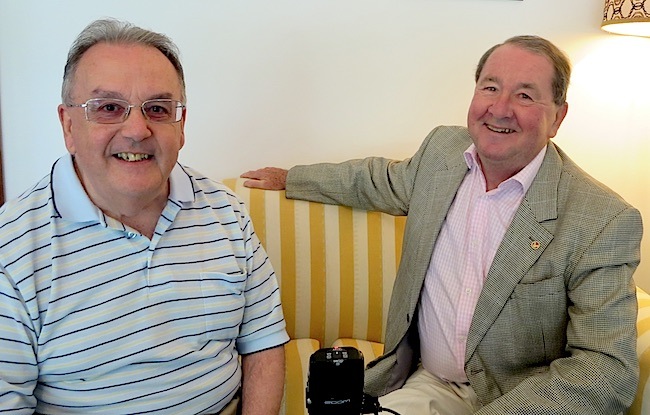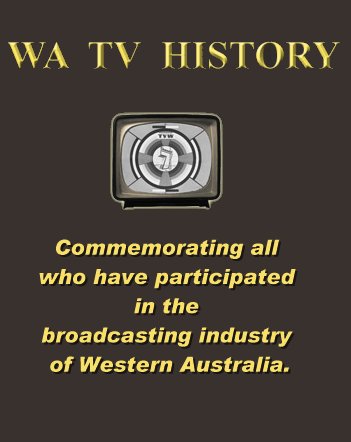Capital Radio story on coming TVW-SEVEN Reunion

Tony Howes of Capital Radio 101.7 FM interviews Keith Bales a veteran of 6KY, TVW7, STW9, News Corporation, Walt Disney and many other ventures about the latest reunion of television staff in Perth, Western Australia.
This is a last call for former TVW-SEVEN staff who wish to partake in a Reunion on Sunday April 19th, 2015.
We keep losing key people every year from the pioneering era in Western Australia, hence the urgency to have another reunion before it is too late for the older contingent.
The event will be held at the Moon and Sixpence at 300 Murray Street, Perth. The traditional British Pub located near the corner of William Street and Murray Street. This event will be happening between 2pm and 5pm on April 19th, 2015, with an option to kick on until closing time.
2015 TVW-SEVEN Reunion Promo
WA TV History
Tony Howes of Capital Radio 101.7 FM interviews Keith Bales a veteran of 6KY, TVW7, STW9, News Corporation, Walt Disney and many other ventures about the latest reunion of television staff in Perth, Western Australia.
Full details on the 2015 TVW-SEVEN Reunion can be found at…
More on 2015 TVW-SEVEN Reunion on April 19th
Tony Howes and Dale James present their popular magazine style radio program, Capital Events, which can be heard on Capital Radio 101.7 FM & Capital Digital from 6 to 8 pm each Thursday.
Capital Radio 101.7 FM in Perth – Capital Events
WA TV History
Tony Howes and Dale James explain what they are trying to achieve by informing and entertaining seniors in Perth, Western Australia, in presenting their popular magazine style radio program, Capital Events.
Capital Events is a radio program that can now be heard all over the world, courtesy of the Internet.
“Capital Events” is now in its 35th week to air. It is produced by Tony Howes and presented by him with colleague Dale James and is heard on Capital Radio 101.7 FM & Capital Digital from 6 to 8 pm each Thursday. Its brief: to promote the arts in all their forms, and, especially, the people who make them happen; to inform about events happening in and around Perth that reflect “community”; to feature music performed by WA artists, wherever possible; and to present music of all styles. Since it began, programme guests have included Alison Fan, Stephen Bevis, Stephen Scoufield, Jenny Davis, Rick Hearder, Ian Westrip, Justin Freind, Trudy Dunn, Alan de Lacy, Felicity Kendall, Sarah Mulcahy, Fiona Campbell-Smith, Sandra Gorringe, Joan Pope, Digby de Bruin, Jenny Hayes, Libby Hammer, Sarah McNeill, Duncan Ord – and a whole lot more! Archival style recordings also feature: original Australian casts of music theatre such as “Godspell” and “The Sentimental Bloke”, etc.
The WA TV History web page research team of Richard Ashton, Gordon McColl and Ken McKay will be busy seeking out amusing accolades from interesting folk in the performing arts and veterans of Radio, Television and the Cinema industries. We’ll be doing this to aid Tony Howes in his quest to promote the arts and entertainment happenings, even if they mainly be about the behind the scenes accidents and pranks.
The Capital Radio web site is…
http://www.capitalcommunityradio.com/
Capital Radio interview on WA Television History
Many pranks were played among staff in the pioneering days of television in Western Australia. Its a side of broadcasting the public never saw.
There were many aspects to working for a television station in Perth during the pioneering era. Each station had its culture, often impacted from the top down by the organisation’s philosophy, but also from the bottom up depending on how much initiative the rank and file were permitted and how much latitude to muck about.
A great working environment was one where it felt like a family, where staff not only worked hard but also played hard too, each looking out for the other.
ABC Television depended on a tight working team more than everyday radio, for the radio announcers often had a great input on selecting the music and content. Though this changed at the ABC when each show was given a producer and journalistic skills became more important than having a person with golden tonsils who could speak proper.
ABC Television could also be influenced by the shift leaders. Running the shift as if it was a military operation did not always prove harmonious should the leader be too autocratic and dictate rather than let capable people get on with the job. Other shifts could be less stressful where the leader maintained not only an efficient team, but also a happy one.
The early days at TVW Channel Seven comprised a team of people who learnt on the job and often looked out for each other. They were like a family with input coming from all members of the team. During the pioneering era, the average age of the staff was relatively young, including that of many of the upper managers.
There was much fraternising both on the job, in the staff canteen and socially outside of work. Many long term friendships were formed and in some cases marriages. There was also great latitude for pranksters in the early days.
The ABC in comparison was a much older organisation, and thus had staff in a older age bracket, and in particular some of the supervisors and managers. It also had the mindset of a government department, being more bureaucratic than a younger and smaller establishment.
Many in Western Australia felt that the ABC Radio folk operated more like a family, with great camaraderie between the workmates. In television, a lot would depend on which area a person was allocated to, as the culture tended to vary between technical and production folk. In some shifts there was great cooperation, whereas on another there may be a them and us situation.
The early ABC announcers portrayed an upper British appearance and sound, when the policy was to emulate the BBC. Yet those same folk, who may appear stuffy on-air, were often very clever and witty in person and good fun.
Many pranks were also played by ABC staff… depending on how conducive the environment was at that time.
Related stories:
- More on 2015 TVW-SEVEN Reunion on April 19th
- 2015 TVW-Seven Reunion
- A Historic Era of Television Activity is Coming to a Close for Seven Perth
- Last Seven Perth News from the Dianella Studios
- Rick Ardon and Susannah Carr celebrate 30 years reading Seven News together
- Life and Work on the Other Side of Your TV Screen







